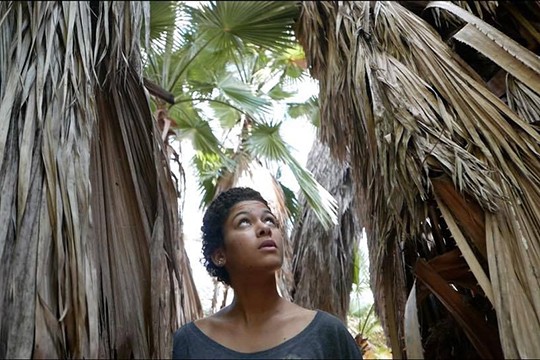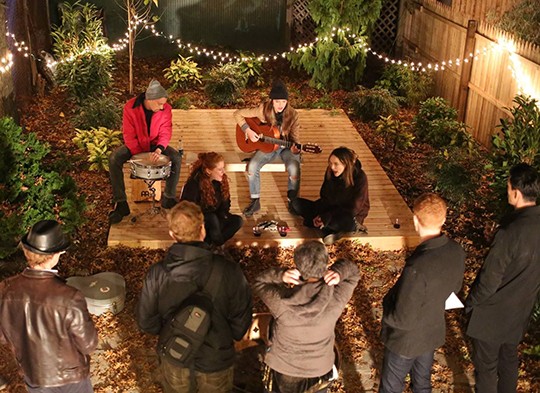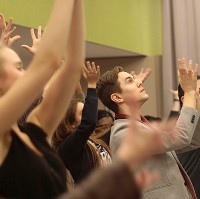Climate Change Theatre Action
Motivation
While an increasing number of people around the world believe that climate change is real, few feel personally concerned, and even fewer are willing to do something to address it. In an effort to break this pattern, Chantal Bilodeau of the theatre organization The Arctic Cycle, Caridad Svich of NoPassport Theatre Alliance, and Elaine Ávila and Roberta Levitow of Theatre Without Borders, created the international project Climate Change Theatre Action (CCTA) in 2015.
CCTA is a series of readings and performances of short plays about climate change presented worldwide every two years to coincide with the UN Conference of the Parties (COP). The first edition overlapped with the 2015 Paris COP. The next will coincide with COP23 in 2017 in Bonn, Germany.
Process
1.Commissioning
Fifty professional playwrights from four continents are commissioned to write short plays (1-5 minutes) that address an aspect of climate change. The playwrights are selected for their diversity (geographic, cultural, and stylistic), talent, experience, and passion for addressing pressing social and environmental issues. They can write about any aspect of climate change from heat waves, droughts, and floods; to politics, social injustice, and renewable energy. CCTA asks that they keep the production requirements simple so the plays can be read script-in-hand, or performed with minimal staging. The plays should be inspiring, avoiding doomsday scenarios. The playwrights must agree to make their plays available royalty-free for the duration of the project.
2. Recruiting
While the plays are being written, CCTA recruits collaborators such as theatres, universities, environmental groups, individual artists, etc. Collaborators are asked to commit to organizing an event during the project period using at least one of the plays in the CCTA collection. They are free to add additional material and to design their event to reflect their aesthetic, the needs of their community, and the resources available. They are also encouraged to include an “action” in their event. An action is defined as something additional to the theatrical experience, which aims to connect or energize people, or both.
3. Presenting
Over the six- to eight-week project period, presentations happen on a daily basis, sometimes with several events on one day. Collaborators can live-stream their event through the Boston-based HowlRound TV if the technology is available. CCTA uses social media to rally people worldwide, connecting writers to collaborators and collaborators with each other, and sharing photos, videos, and general impressions of each event. Not only is the impact of local events enhanced by the fact that they are part of a global initiative, but collaborators are energized by knowing they are working in tandem with artists in other countries, raising awareness about an important issue.


© Mindi Dickstein. Still shot from the film adaptation of Starving to Death in Midtown by Mindi Dickstein, featuring Yasmin Adams, directed by Evan DeLorenzo and produced by Pomona College.
Outcomes and dissemination
In 2015, over 100 collaborators in 26 countries hosted CCTA events. In the USA alone, 53 events took place in 37 cities. Plays were read, performed, adapted to film and audio pieces, presented as part of day-long festivals or stand-alone events, in theatres, high schools, universities, eco-centers, community centers, people's living rooms, on radio, and outdoors.
Some of the events that particularly stood out include:
- A week-long series of activities organized and performed by the students of Baker High School in Baldwinsville, New York.
- A solstice celebration in an eco-village in Denmark that included refugees from a nearby refugee center.
- A reading at the foot of the Mendenhall Glacier organized by Perseverance Theatre in Alaska.
- A film by Italian artists entitled Video Postcard from the End of the World, shot in Armenia, and based on texts from over 27 CCTA plays.
Examples of “actions” included:
- Artichoke Dance Company in Brooklyn, New York had a representative from the local chapter of the environmental organization 350.org come and talk about their current initiatives.
- Rogue Machine Theatre and HeatWave Theatre in Los Angeles, California held a presentation by climate scientist Joshua Fisher from the NASA Jet Propulsion Laboratory.
- Arizona State University invited representatives from Chispa Arizona, a program of the League of Conservation Voters, to present on the importance of civic engagement in tackling climate change.
“The conference attendees were thrilled—with the variety of voices represented by the plays; by the humor and poetry; by the very PERSONAL take you each had on the topic—a relief for them, after a day of discussions around the abstract...”
— Catherine Coray, New York University Abu Dhabi
In addition to traditional media coverage, live-streamed events remain accessible online indefinitely. In some instances local events received extensive coverage. For example, in 2015, the event organized by Ethnic Kitchen in Lithuania was covered by the Lithuanian National Radio and National Television. At the end of the project, the plays are made available for teaching purposes, and the current collection will be published in an anthology in 2017.
How might this work support the global transformation to sustainability?
Psychology says we can’t change behaviors unless we change the underlying beliefs and values that drive those behaviors. CCTA brings communities together around a politically charged issue, and creates a safe space for reflection and conversation. Through storytelling, it humanizes a challenge that is often distant and abstract, and invites people to question their assumptions. Because the events are organized locally, they have a greater chance of being well-received—we naturally trust people we know or those we feel we have something in common with. In addition, CCTA encourages the creation of local networks and empowers communities to decide what is most important to them. It unites people globally, adding weight to their efforts and promoting cultural understanding.

© Julia Deffet. Esther Sophia Artner in A Swan Song: Voices on Climate Change produced by the Box Collective in Brooklyn, USA

Chantal Bilodeau is a playwright, translator, and research artist whose work focuses on the intersection of science, policy, culture, and climate change. She is the artistic director of The Arctic Cycle, founder of the blog and international network Artists & Climate Change and a co-organizer of the biennial CCTA.
The Arctic Cycle
IIASA Science and Arts Brochure
IIASA on YouTube


